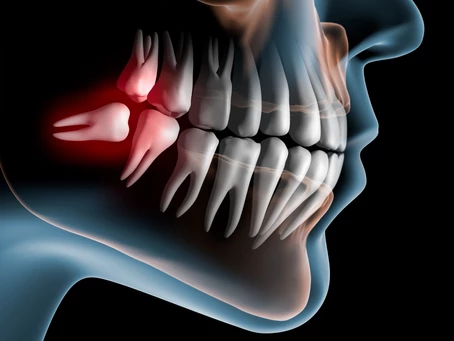Ever wonder why the last four teeth to grow in are called wisdom teeth? Well, it’s because they usually don’t arrive until the late teens or early 20s. By then we’re supposed to be wiser. And speaking of wisdom, it’s often wise to remove one or more of these teeth, even if they aren’t causing pain. Let’s examine why.
A wisdom tooth also called a third molar, is supposed to grow straight up through the gum, the same as any other tooth. But that often doesn’t happen and a wisdom tooth can become impacted, meaning it remains partially or totally surrounded by bone and gum tissue and is possibly blocked by a neighboring tooth. What causes this? Well, the jaw may simply be too small to accommodate more teeth, which forces a wisdom tooth to push against its neighbor.
Sometimes the wisdom tooth itself causes the impaction by growing in a direction other than straight up. In either case, the constant pressure of an impacted wisdom tooth can cause the root of the adjacent molar to deteriorate through a process called resorption. The second molar tooth root is literally dissolved by the pressure of the wisdom tooth. What’s more, an impacted wisdom tooth may create a passageway for the bacteria that cause gum disease to reach both the second and third molar tooth roots and attack the bone around them. That’s why it is often better to be proactive and remove the wisdom teeth before any problems occur.
X-rays and a clinical exam are the best way for your dentist to determine whether your wisdom teeth need to be removed. At this time, the benefits and any possible risks of the procedure can be discussed. If it turns out that removing the teeth is in your best interest, please be assured that this is a very routine dental procedure carried out millions of times each year. Wisdom tooth removal is usually done in a dental office under local anesthesia to numb the area and conscious sedation to relax you.
After the procedure, you may experience some swelling and mild soreness. This can often be relieved with cold compresses and over-the-counter medication. You’ll be given post-operative instructions tailored to your individual situation. If your impacted wisdom teeth are not removed, it will still be necessary to monitor them periodically to make sure that they’re not affecting the health of your other teeth. While it’s best to take out wisdom teeth before their roots are fully developed, they can also be removed safely later in adulthood and you’ll still be just as wise even without your wisdom teeth.
Top 5 Things to know about Wisdom Teeth
Everyone has heard of wisdom teeth. But how much do you really know about them? Here are five wise facts about these sometimes-misunderstood molars. First step, Number Five. Wisdom Teeth are technically called Third Molars. Wisdom Teeth are the last molars to develop, usually appearing between the ages of 17 and 25 around the same time that a moderate amount of wisdom is said to appear. Fantastic Four.
Most adults have four wisdom teeth. The wisdom teeth are located at the back of the mouth on the left and right sides of the upper and lower jaws. Number Three. Many people don’t have enough room for wisdom teeth. Human evolution has decreased the size of our jaws, but not the number of our teeth, creating a tight squeeze. When there isn’t enough room for these teeth when they emerge, they are said to be impacted.
Impacted wisdom teeth can cause significant problems. Pain, bacterial infection, periodontal disease, and damage to adjacent teeth can result from impacted wisdom teeth. They can also cause cysts, which can eventually lead to bone loss in the area surrounding the wisdom teeth. And finally, Number One. Removal of impacted wisdom teeth is a routine procedure. Impacted wisdom teeth may be extracted by a dentist or an oral surgeon. This routine in-office procedure is often performed under local anesthesia with conscious sedation. So, when it’s all done, you won’t even remember it.


